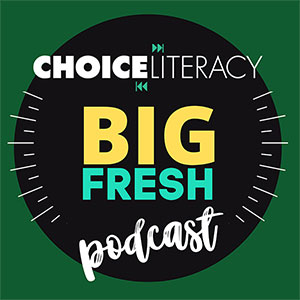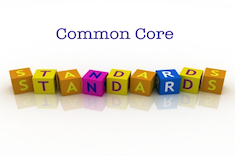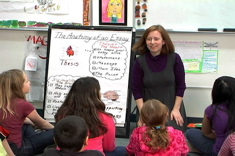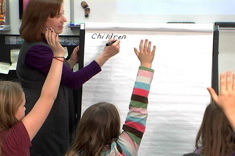Franki Sibberson chats with Bud Hunt about writing and the Common Core. Bud is the author of the popular “Bud the Teacher” blog: http://budtheteacher.com/blog/
You can download a free copy of this podcast at the Choice Literacy iTunes site:
http://itunes.apple.com/us/podcast/choice-literacy-podcasts/id488875239
A full transcript is available below the player.


Franki Sibberson: Bud, you’ve become interested in the Common Core standards in the area of writing lately, can you talk about your interest?
Bud Hunt: Yeah. Well, I think anybody paying attention to public school education right now is interested in core to some degree. And the thing with the Common Core standards that I think has been really interesting were the Common Core state standards to be proper is that I think a lot of people are excited about them, nervous about them, worried about them and quite a number are intrigued by them. But not so many people are actually reading them. So I’ve been trying to get people’s eyes on them just to look at what they actually say and what they mean. So that has been my interest and it’s been fun to have conversation and write with people about what they actually say versus what they don’t say. And sometimes what they don’t say is as interesting as what they do.
Franki Sibberson: What they say, that smart. So you are just really spending time getting to know them, with the teachers. That’s smart. So where do you think writing instruction – do you think these new standards will change writing instruction incredibly?
Bud Hunt: Well, you know, I will give you my optimistic answer and then my pessimistic answer.
Franki Sibberson: Okay.
Bud Hunt: My optimistic answer is yeah, they intentionally state deliberately that literacy and writing are components not just of the language arts classroom, but also skills and habits for the other concept areas. Select that very level, I think there’s an opportunity here and that is another thing that I think is reason to spend time with the standards right now. There’s an opportunity here to carve out what that could look like in the content areas. Elementary teachers, I think, are more adept at this then secondary teachers are but they actually say well, if the standard says we must write in science, let’s write like scientists. And if the standard says we must write and read and compose in math, let’s write and read and compose like mathematicians. So my optimistic self says there’s a neat opportunity there.
The pessimist in me says this isn’t the first writing across the curriculum agenda that we have seen in public education and it probably won’t be the last. And until we can actually get in to classrooms and spend time with teachers as readers and writers, be that science teachers or music teachers or PE teachers or whatever, I don’t think that’s going to translate into the classroom. So my hope with Common Core PD, although I don’t see this happening as much as I’d like, is that it would be focused on reading and writing and thinking in those various disciplines.
Franki Sibberson: So you think it’s a good – am I reading you right that it’s a good kind of starting off point to start talking and thinking about what this could be?
Bud Hunt: Yeah, I think it’s as good as a lot of others. I think there are some limitations in the standards and I think there is a sense in the Common Core as I read them that they were written with a test in mind as much as anything else. There’s still some really good language in there of what it means to be someone who does math and what the role of writing is in other content areas. The fact that there is a consistent set of literacy standards for all content areas is a step and we can choose to step in a useful direction with that or we can just kind of dodge it like we have been doing I think collectively at the policy level for quite some time. I hope that’s not what’s happening.
Franki Sibberson: Yeah, well I like your optimistic view. I like it.
Bud Hunt: I wish my optimistic self lived with me all the time.
Franki Sibberson: Yeah, that would be nice. That’s funny. So talking about writing deeply across disciplines with the Common Core, can you talk about what your vision would be for what that might look like across grade levels?
Bud Hunt: Yeah. At its simplest, well, I’m teaching a course right now for Peer-to-Peer University and in that course and in the National Writing Project is to help me develop it. And in some of the early conversations we had about the class, the notion of writing in Common Core is played out in two ways. One is writing across the content areas so habits of composing and thinking and using writing as a tool for learning and reading as understanding in all of the things that I think most writing teachers and thoughtful composition folks have been saying for years, writing is a tool for thinking and knowing and understanding. So writing across the content areas and writing across the curriculum, those things I think are good.
But then there is also writing for the content areas. I have been reading this biography lately about Albert Einstein and I was just struck by how much a man of letters he was. He wrote letters to his wife and to his girlfriend and to his other girlfriend, but also to his friends and his children and his colleagues. And he was very much a writer who used math to help them understand the world, but also he also used writing to help them understand the math. And he helped other people understand it that way. He read books about the math because he wanted to teach people.
And I think we need to be asking how do people use writing in content? Our politicians, one of the key documents in this country are documents that were written by people, right? Thomas Jefferson sat down and hammered out a draft of the Declaration of Independence. Scientists write. They write by arguing. The fancy research is just an argument, a well supported argument that they share and pass around so that folks can talk about it.
So I think thinking about writing as both a habit for learning and then a tool for communication in the content areas, those are two lenses that I think are really useful. Writing across and then the writing for.
Franki Sibberson: That’s exciting stuff. That could change things. So that’s the thing that you think is the biggest difference with the Common Core?
Bud Hunt: Well, I don’t know that it’s different. I wouldn’t say that previous standards have neglected that. The NCTIRA standards of the early 1990s were very much about what writing was for. What’s different now is we’ve got a political climate that has adopted that Common Core language and I have some concerns about some of the details and some of the skills that it asks of student writers. Like it asks that students in early elementary be able to sit down and type out so much in a certain time period. That feels very much like an assessment goal, not a writing goal.
But at the end of the day, there is a very serious piece of attention being played to the role of reading and writing in all of the content areas and I think that’s worth capitalizing on and trying to take advantage of and I’m excited to see folks like NCTE and NWP saying okay, here’s what we can do with these things and here’s what we should be doing. My hope is that we don’t lose sight of the shoulds as we are worried about how we are going to pay for the musts. That’s something I worry about. There are a lot of things that can go wrong with that and it’s really going to take the focus well on the parts of folks to say this is what teaching and learning should look like. And this is what the professional development should look like, right? If we think that writing should happen across all content areas, we need to make sure that we are writing with our teachers across all content areas. That’s a different way for folks to spend their time that I wish were the case.
Franki Sibberson: So with 21st century learning and with the technology that you do, how do you see the connection between that and the Common Core?
Bud Hunt: Well, in the state of Colorado, we had just been through a standards revision process right before Common Core came so we adopted new standards in the state and then immediately tried to figure out where Common Core fit in them. And what they did in the Colorado standards was in the 21st Century Skills language which was nested within the case K-12 standards. So here in Colorado, there are 21st Century standard elements in all of our standards. The Colorado flavor of Common Core is very much a document that is flavored by both of those elements.
To me this is about 21st Century Skills notions of collaboration and communication and partnerships and inquiries. Those live in any good writing program and whether or not you are talking about computers or keyboards or iPads or this, that or the other thing, the foundational elements of inquiry and working together and struggling through big ideas I think we’ll get you towards competency in the 21st Century Skills areas.
Franki Sibberson: So they are pretty aligned?
Bud Hunt: Well, I think so, yes. I don’t know that that comes through in practice all the time.
Franki Sibberson: If you are a teacher that is just starting to think about Common Core, how can we best get to know the Common Core and look at them in a way that helps us hold true to what we know about good writing instruction?
Bud Hunt: Well, I would approach them as readers. Literally, on my website right now if you go to Budtheteacher.com/commoncore I have pulled out the Common Core standards and they are available as comment’able’ elements. You can write comments in there. Some people who have been having conversations there through the class I mentioned earlier and some other things read them, argue about what they mean and say. There are a lot of people arguing about what’s going to happen with the standards. But I say start with the standards themselves.
I would also look at the body of work that others in the blogosphere here are doing with Common Core. Critics like Tom Hoffman and MaryAnn Riley. Pay attention to what organizations are saying about literacy and instruction. And don’t just rely on the Common Core to be your foundational only text. The stuff that’s come before should inform them as well. I think NCTE and their notions of 21st Century literacy are really important for early career teachers to be thinking about.
But be writing, be thinking, be reading and just approach the text rather than the hype.





